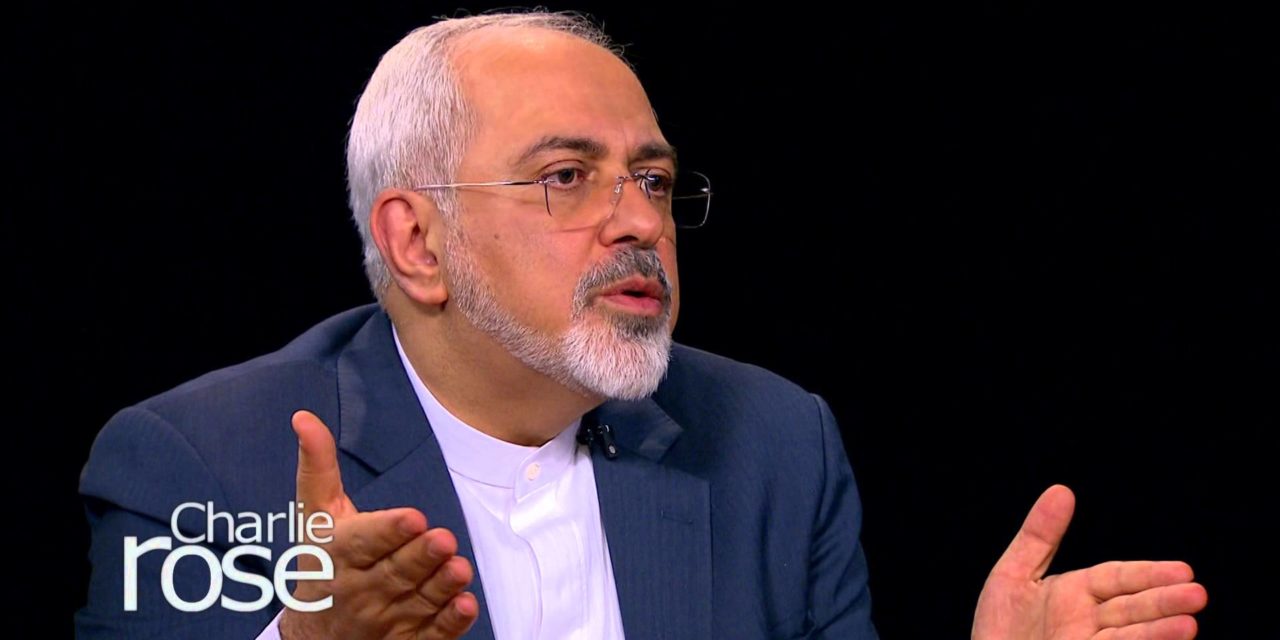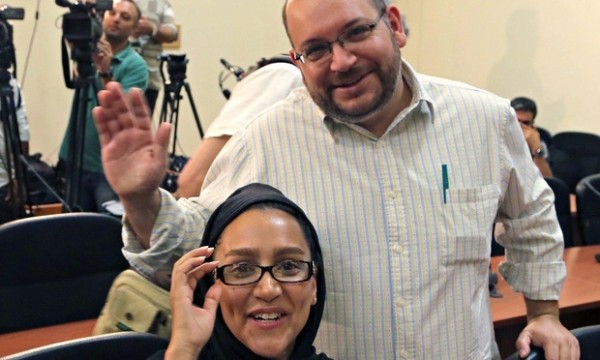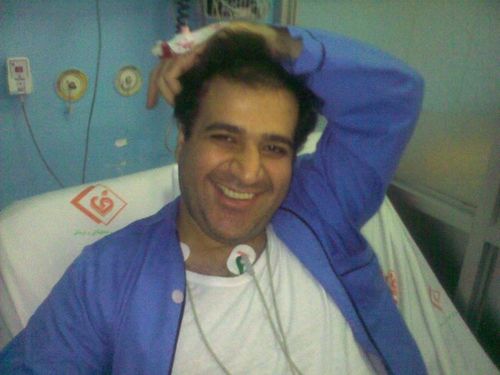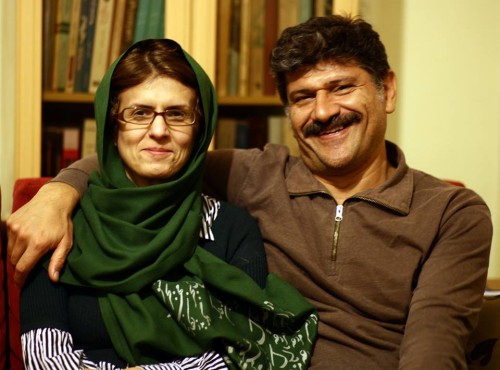Last Wednesday, speaking to the American television network CBS, Iran’s Foreign Minister Mohammad Javad Zarif said flatly while talking about the case of detained Iranian-American journalist Jason Rezaian, “We do not jail people for their opinions”:
Given that thousands of people have been detained over their dissent before and after the disputed 2009 Presidential elections, Zarif’s declaration has raised much interest.
Among the responses are those of Iranian journalists and activists who have experienced first-hand the punishment of opinion. They have written “Dear Charlie Rose” letters to Zarif’s interviewer.
From Iran Wire:
Fariba Davoodi Mohajer
I, Fariba Davoodi Mohajer, have been a journalist for 20 years. During this time, I have witnessed the arrest of journalism colleagues, editors, members of journalists’ rights groups, and members of the Iranian press. I saw friends prosecuted in the Press Court, as well as by different branches of the Revolutionary Court, and imprisoned. Some of them put up with fierce interrogation, solitary confinement, and mental and physical torture. Some others, like the Iranian blogger Sattar Beheshti, died under torture.
Dear Charlie Rose, I was incarcerated in a men’s prison for 40 days and subjected to the most brutal kind of mental torture and constant interrogations. During those 40 days, I witnessed the cruelest torture against journalists in the prison cell next to mine, journalists like Hadi Saber, whom I can still hear being beaten across the face by the interrogator, and who ended up dead in hospital for unknown reasons.
Mr Rose, allow me to testify that many of my journalist colleagues were prosecuted in unjust courts, where they were forced to testify against themselves and their beliefs. They confessed to being traitors and spies, and after so long, they still have nightmares about solitary confinement, interrogations and torture.
As a journalist and human rights activist, I watch with regret when Mr Zarif blatantly lies in front of the cameras of a broadcaster, without any shame with regard to public opinion, while many Iranians are still in prison for simply holding certain beliefs. Even when they are freed, they enter a bigger prison, where they will constantly be monitored and fear arrest. These people have already lost their family, their job, and their dignity. They have had their lives ruined.
If it weren’t for fear of prosecution, my friends in Iran would write a testimony letter just like mine. They do not have access to a broadcaster to voice their protest against Javad Zarif — while you give him a platform, viewed by many, to lie. I am not hopeful that you will read my letter. If you do, I expect you to tell the world the story of journalists, human and women’s rights activists, and minorities in Iran who have experienced dark days in prison, undergone interrogation, and even received death sentences in some cases.
Shahram Rafizadeh
I was arrested on September 7, 2004 at the offices of Etemad Newspaper, and carried to a secret jail.
When I was arrested, I was explicitly and directly charged for my journalistic activities and weblog writings. The reasons presented for my arrest included articles I had published on the Emruz website.
All the interrogations that took place during the 73 days I was held in that secret jail, or during the 13 days I was held in Evin Prison, referred explicitly to my articles and journalistic activities….
When Mr. Zarif said in his interview, “We do not jail people for their opinions,” I felt deep revulsion.
One of the things that really irritated me and other Iranians during the eight years of Mahmoud Ahmadinejad’s presidency was the lies. Lying is the red line for free thinkers and the Iranian people.
Mr. Zarif and President Hassan Rouhani should know that their government came to power because of the support of the journalists who are now in prison.
They came to power even by the support of the 2009 presidential candidates Mir Hossein Mousavi and Mehdi Karroubi, who are still kept under house arrest. In reality, Mr. Rouhani’s government is a proxy government.
Those who voted for Mr. Rouhani were Mr. Ahmadinejad’s opposition. People realized that Mr. Ahmadinejad’s government was based on lies. Since one of Mr. Rouhani’s main slogans was fighting against lies, people elected him.
So when Mr. Zarif repeated the same lies that Mr. Ahmadinejad kept saying, I felt extremely sorry that even in a proxy government, which came to power as the result of the votes of the majority who are against lies, there are still people who easily lie.
Washington Post correspondent Jason Rezaian, imprisoned since July, and his wife, reporter Yeganeh Salehi, released on bail in October:
Fereshteh Ghazi
Mohammad Javad Zarif’s claims in the interview with PBS were neither fair nor diplomatic. They contained no sign of wisdom or intelligence in diplomacy. His lies make him responsible for all of the human rights issues in the Islamic Republic….
Hearing Zarif’s claims sent me back to the interrogator’s room in the underground detention center in Ketabi Street in Tehran, where the printouts of my reportage and interviews became proof of my “crime.”
It sent me back even further to the 1960s, when so many political prisoners were executed and buried in Khavaran cemetery, and all the prison cells were full of journalists, political and civil society activists, as well as the voices of mothers, fathers, children and spouses of imprisoned journalists and other political prisoners.
Today, journalists and activists are still deprived of their basic human rights, and are still behind the bars: Ahmad Zeyabadi, Massoud Bastani, Abdolfatah Soltani, Mohammad Seifzadeh, and Bahareh Hedayat are all political prisoners.
There are hundreds of others. If we don’t have any political prisoners or prisoners of conscience, then why did Rouhani promise to set them free when he was seeking power?
Hassan Rouhani’s task is not only to advance a nuclear deal. His main duty is to monitor the correct implementation of the Constitution. He must notify all other authorities in the country when they deviate from it. This is the least he can do for Iran’s hundreds of political prisoners.
Seen from this angle, the performance of Rouhani’s government is grim. Whether it is President Rouhani himself, or Mohammad Javad Zarif sitting in front of international media, the administration’s only approach is to deny.
Mehdi Mahmoudian in hospital during his detention from 2009-2014:
Masih Alinejad
Mr Zarif’s words about journalists and prisoners of conscience in Iran are not new, but because this time, they have had vast repercussions.
The first time I was injured by Mr Zarif’s lies was when the families of those sentenced to death called me and sent me messages, asking me why I was silent and would not say a word. Mr Zarif had said before that there are no political executions or political prisoners in Iran. He had injured journalists before, but many of them chose to be silent because their names were not specifically mentioned….
There was no reaction to his remarks the first time he made them, and this made Mr Zarif think that such remarks did not matter much. This time, he proceeded to speak bigger lies about the internal issues in the country….
So when I heard him repeating the same lies on an even larger scale, I began to cry. I recalled all the individual cases where people were executed; real people with real names, all of whom Mr. Zarif conveniently denies….
Behind Zarif’s smiling face, there is a mountain of cries and the wounds of families who, unlike journalists, have no name and are not well known. I have heard their cries in private: families of political prisoners whose voices who are never heard in international media, or even by active Iranian journalists inside the country.
I am one of the victims who was not able to see my family for five years because of expressing my views. People working for Iran’s national television visit my parents, and force them to make remarks against me. My family and the families of many other journalists who have left the country are hostages in Iran; they are not even allowed to leave the country to visit their loved ones. They spend their lives in fear, and suffer from anxiety and stress….
I interviewed the families of 57 people who were killed in peaceful demonstrations in 2009. I have talked to tens of people who were executed because of their beliefs. I have talked to Baha’i families who have no rights to higher education because of their religion. I have documented and registered the cases of 108 journalists who were killed after the 2009 election. Now I am in touch with nearly one million people through My Stealthy Freedom Facebook page, women whose problems are never published inside the country.
In Iran, a political voice that criticizes or opposes the dominant rule does not find a way to be heard. Those who express their views are either executed or imprisoned or expelled from the country, or…banned from working….
Jila Baniyaghoob (detained periodically between 2009 and 2013) and Bahman Ahmadi Amouee (detained 2009-2014)
Mohammad Javad Akbarin
After I was summoned to a tribunal in summer of 2000 for the first time, the interrogations began, leading to my imprisonment.
I was detained and then prosecuted specifically for writing four articles in journals….
I was not surprised by Mr Zarif’s remarks saying that in Iran nobody is imprisoned because of having certain beliefs; I am quite familiar with it. The story still goes on: raw between politics and laws. As for my personal experience in this regard, I must say that my trial was a comedy trial. I was not allowed to choose a lawyer and none of the justice procedures mentioned in the press charges regulations were observed. I asked them: why is there no jury if I have been charged with press violations? Why the court is not public? The judge said, “No! Your charges are not of a press nature! You are accused of acting against national security by using your pen, exactly like when a charlatan publishes an advertisement about a fake company and robs the people. Can we say that because his ad was published in a newspaper, it is a press charge?”
I was angry when I heard this comparison and said: Journalism has a definition; each column you read in a newspaper has a definition. This is why the law has distinguished between press charges and other sorts of crimes, such as fraud. And just to prevent people like you from making irrelevant comparisons, the law says a jury must be present and the court must be public, so that the people can judge and you will be prevented from suppressing freedom of expression indefinitely.
Siamak Ghaderi
There are hundred of documents and much evidence to refute Mohammad Javad Zarif’s claim that “In Iran nobody is in prison for their opinions.” Many journalists, as well as political and religious activists, have been jailed for their opinions — and are still in prison.
In my own case, when I was condemned to four years of imprisonment, for weeks I signed and confirmed articles that I had published which would be used in court as evidence of propaganda against the government, society and as proof of conspiracy.
Despite that, my intention is not to refute Mr. Zarif’s claim during his interview with Charlie Rose. My intention is to remind the public of the strategic mistake of a figure who is active on modern social networks and uses them to disseminate information. In addition, I want to refute the claim some have made that they will adopt a new approach when it comes to the Islamic Republic of Iran and its international relations….
Unfortunately, the Foreign Minister’s mistake is that, by disclosing the details of Jason Rezaian’s case, probably still unknown to both the accused and his attorney, he is playing the role of the spokesman of an unjust judicial power, which has sent thousands of innocent people to prisons under the pretext that they pose a threat to the country’s national security. In this way, he is approving and supporting the illegal and inhuman measures of the judiciary, which in itself disproves the claimed autonomy of this power….




